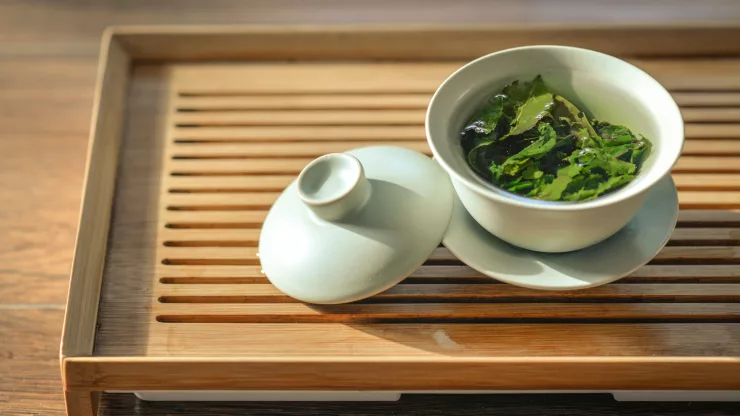Green tea is one of the most consumed beverages worldwide. It has been enjoyed for centuries and is known for its numerous health benefits.
In this article, we will unveil the numerous benefits of green tea and how to prepare it for optimal benefits.
Jump to Section
Introduction
What is Green Tea?
Green tea is a type of tea that is made from Camellia sinensis leaves, which have not undergone the same withering and oxidation process used to make oolong and black teas. It originated in China but has now spread to other parts of the world, including Japan, India, and Sri Lanka.
History of Green Tea
Green tea has been consumed for thousands of years, dating back to ancient China. It was initially used for medicinal purposes before it became a popular beverage.
During the Tang Dynasty, tea became an essential part of Chinese culture, and it was used for religious, medicinal, and social purposes.
Buddhist monks used it to stay awake during meditation sessions, and it was also used as a tribute to the emperor.
Health Benefits of Green Tea
Boosts brain function
Green tea contains caffeine, which is a stimulant that can improve brain function.
It also has an amino acid called L-theanine, which can increase dopamine and alpha waves in the brain, leading to increased alertness and relaxation.
A study showed that green tea can improve cognitive function and reduce the risk of dementia.
| Relative Table |
|---|
| Improved Brain Function |
| Increased Alertness |
| Reduced Risk of Dementia |
Promotes weight loss
Green tea is commonly used as a weight-loss supplement due to its ability to boost metabolism and fat oxidation. The catechins in green tea activate the body’s thermogenic fat-burning activity, leading to increased fat burning. Studies have shown that drinking green tea can lead to a reduction in body weight and waist circumference.
| Relative Table |
|---|
| Increased Fat Burning |
| Reduced Body Weight |
| Reduced Waist Circumference |
Reduces risk of cardiovascular diseases
Green tea has been shown to reduce the risk of cardiovascular diseases, including stroke and heart disease. The antioxidants in green tea can reduce inflammation and improve blood vessel function.
A study showed that drinking green tea can reduce the risk of coronary artery disease by up to 31%.
| Relative Table |
|---|
| Reduced Risk of Stroke |
| Reduced Risk of Heart Disease |
| Reduced Risk of Coronary Artery Disease |
Helps prevent cancer
Green tea contains antioxidants known as catechins, which can help prevent cancer. The antioxidants can reduce the formation of free radicals, which can damage cells.
Studies have shown that green tea can reduce the risk of breast, prostate, and colorectal cancer.
| Relative Table |
|---|
| Reduced Risk of Breast Cancer |
| Reduced Risk of Prostate Cancer |
| Reduced Risk of Colorectal Cancer |
Lowers risk of type 2 diabetes
Green tea can reduce the risk of type 2 diabetes by improving insulin sensitivity and glucose tolerance. The polyphenols in green tea can also reduce blood sugar levels.
A study showed that drinking green tea can reduce the risk of developing type 2 diabetes by up to 42%.
| Relative Table |
|---|
| Improved Insulin Sensitivity |
| Improved Glucose Tolerance |
| Reduced Blood Sugar Levels |
Supports oral health
Green tea can improve oral health by reducing inflammation and preventing the growth of bacteria that can cause bad breath and tooth decay. The catechins in green tea can also help prevent the formation of plaque.
Improves skin health
Green tea can improve skin health due to its antioxidant and anti-inflammatory properties. The antioxidants can reduce oxidative stress, which is a major cause of skin aging, while the anti-inflammatory properties can reduce inflammation and redness.
Enhances bone density
Green tea can enhance bone density by reducing inflammation and oxidative stress, which can lead to bone loss. Studies have shown that drinking green tea can lead to increased bone mineral density and a reduced risk of fractures.
Aids digestion
Green tea can aid digestion by improving gut health and reducing inflammation. The catechins in green tea can also kill bacteria that can cause digestive problems.
| Relative Table |
|---|
| Improved Gut Health |
| Reduced Inflammation |
| Kills Bacteria |
Boosts immunity
Green tea can boost immunity due to its antioxidant and anti-inflammatory properties. The antioxidants can reduce oxidative stress, while the anti-inflammatory properties can reduce inflammation and improve immune function.
How to Prepare Green Tea
Tea bags vs Loose Leaf Tea
Green tea can be prepared using tea bags or loose leaf tea. Tea bags are more convenient and easier to prepare, while loose leaf tea has a more authentic taste and can be of higher quality.
How to Brew Green Tea
To brew green tea, heat water to around 80°C and add one teaspoon of green tea per cup. Steep for 2-3 minutes and strain.
Green tea should not be brewed for too long as it can become bitter.
Different Varieties of Green Tea
There are different varieties of green tea, including sencha, matcha, and gyokuro. Each variety has a unique taste and can be prepared differently.
Side Effects and Precautions
Caffeine Content in Green Tea
Green tea contains caffeine, which can cause side effects such as insomnia, nervousness, and restlessness, especially when consumed in large amounts.
Possible Negative Effects of Green Tea
Green tea can have negative effects such as stomach upset, headache, and dizziness, especially when consumed on an empty stomach.
Precautions to Take When Drinking Green Tea
To avoid the negative effects of green tea, it is advisable to drink it in moderation and avoid drinking it on an empty stomach. It is also recommended to avoid drinking green tea late in the day to avoid insomnia.
Final Thoughts
Green tea is a healthy beverage that has numerous benefits for the body.
It can improve brain function, promote weight loss, reduce the risk of cardiovascular diseases, prevent cancer, lower the risk of type 2 diabetes, support oral health, improve skin health, enhance bone density, aid digestion, and boost immunity.
It is easy to prepare and can be consumed in different varieties. However, it is essential to drink green tea in moderation and with caution.
Frequently Asked Questions
What is the best time to drink green tea?
The best time to drink green tea is in the morning or early afternoon to avoid insomnia.
Can green tea help you sleep?
Green tea contains caffeine, which can cause insomnia. It is advisable to avoid drinking green tea before bedtime.
How many cups of green tea should you drink in a day?
It is advisable to drink 2-3 cups of green tea per day to enjoy its health benefits.
Can green tea reduce stress?
Green tea contains an amino acid called L-theanine, which can increase dopamine and alpha waves in the brain, leading to relaxation and reduced stress.

With a deep passion for personal development, Ben has dedicated his career to inspiring and guiding others on their journey towards self-improvement.
His love for learning and sharing knowledge about personal growth strategies, mindfulness, and goal-setting principles has led him to create My Virtual Life Coach.
Contact Ben at [email protected] for assistance.




